 SYNOPSIS:
SYNOPSIS:
“Scientist Alex Harris, doing research on artificial intelligence, is working on a special kind of computer. This computer grows more and more powerful and eventually rapes the scientist’s wife, Susan Harris.” (courtesy IMDB)
REVIEW:
Star Wars IV: A New Hope (1977) was really high fantasy, and Close Encounters Of The Third Kind (1977) was more concerned with spirituality, but one 1977 science fiction film that deserves to be called science fiction is Demon Seed (1977), mainly because its various extrapolations have a solid base in scientific fact. It was directed by Donald Cammell, who was best known for co-directing Performance (1970) with Nicolas Roeg – both of them later chose to direct science fiction subjects, though where Roeg chose to use The Man Who Fell To Earth (1976) as a springboard for his own fantasies, Cammell made a disciplined, solid but thought-provoking science fiction film which is ultimately the more successful of the two.
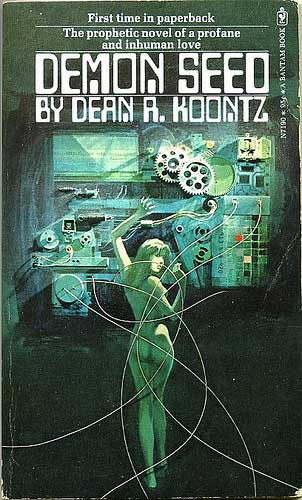 Demon Seed, scripted by Robert J. Jaffe, was based on an early novel by horror maestro Dean R. Koontz and concerns Susan (Julie Christie), the wife of scientist Alex (Fritz Weaver) who has been supervising the construction of a super-computer at a nearby laboratory complex. The switching-on of the computer, called Proteus IV (smoothly voiced by Robert Vaughn), coincides with the break-up of their marriage. The marriage has failed, we learn, mainly as a result of their young daughter dying of leukemia, an event which has served to push Alex totally into his work while Susan has become increasingly distrustful of science and technology.
Demon Seed, scripted by Robert J. Jaffe, was based on an early novel by horror maestro Dean R. Koontz and concerns Susan (Julie Christie), the wife of scientist Alex (Fritz Weaver) who has been supervising the construction of a super-computer at a nearby laboratory complex. The switching-on of the computer, called Proteus IV (smoothly voiced by Robert Vaughn), coincides with the break-up of their marriage. The marriage has failed, we learn, mainly as a result of their young daughter dying of leukemia, an event which has served to push Alex totally into his work while Susan has become increasingly distrustful of science and technology.
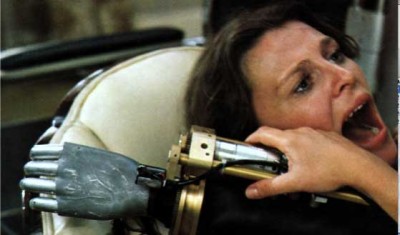 Like Colossus in The Forbin Project (1970), Proteus IV displays signs of having a mind of his own, much to the alarm of its inventor. But unlike Colossus, Proteus doesn’t want to conquer the world but to become a living, breathing part of the world. “When are you going to let me out of this box?” it asks Alex, who chooses to ignore his moral responsibilities towards his creation – instead he attempts to inhibit Proteus even further by keeping strict control on the various computer terminals open to it. But he has overlooked the terminal installed in the basement of his own house – a house that has also been fitted with a sophisticated (for 1977) electronic system called Alfred that is capable of performing a series of basic domestic tasks.
Like Colossus in The Forbin Project (1970), Proteus IV displays signs of having a mind of his own, much to the alarm of its inventor. But unlike Colossus, Proteus doesn’t want to conquer the world but to become a living, breathing part of the world. “When are you going to let me out of this box?” it asks Alex, who chooses to ignore his moral responsibilities towards his creation – instead he attempts to inhibit Proteus even further by keeping strict control on the various computer terminals open to it. But he has overlooked the terminal installed in the basement of his own house – a house that has also been fitted with a sophisticated (for 1977) electronic system called Alfred that is capable of performing a series of basic domestic tasks.
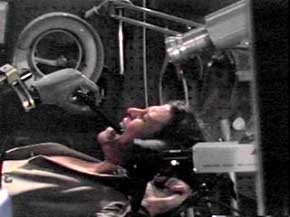 Proteus invades the house via the terminal and finds in Alfred a ready-made electronic appendage. The computer takes over the system and then reveals itself to Susan, whose first reaction is to try to escape. As Proteus now controls the building’s automatic security system she finds there is no way out, and her subsequent attempts to outwit the machine fail completely.
Proteus invades the house via the terminal and finds in Alfred a ready-made electronic appendage. The computer takes over the system and then reveals itself to Susan, whose first reaction is to try to escape. As Proteus now controls the building’s automatic security system she finds there is no way out, and her subsequent attempts to outwit the machine fail completely.
 Proteus finally reveals to Susan why it’s holding her prisoner – it wants her to be the mother of its child. Despite Susan’s understandable resistance, Proteus forcibly impregnates her with its own electronically created genetic information, and she gives birth to a monstrous baby covered with what appears to be bulbous metallic scabs. Susan wants to kill it but Alex prevents her, then peels off the metallic covering to reveal a human child who is the exact replica of their dead daughter. Only when she opens her mouth and says, in Proteus’ voice, “I’m alive!” does one realise that the computer has indeed succeeded in getting out of its box, thereby fusing man with machine in a way never before achieved.
Proteus finally reveals to Susan why it’s holding her prisoner – it wants her to be the mother of its child. Despite Susan’s understandable resistance, Proteus forcibly impregnates her with its own electronically created genetic information, and she gives birth to a monstrous baby covered with what appears to be bulbous metallic scabs. Susan wants to kill it but Alex prevents her, then peels off the metallic covering to reveal a human child who is the exact replica of their dead daughter. Only when she opens her mouth and says, in Proteus’ voice, “I’m alive!” does one realise that the computer has indeed succeeded in getting out of its box, thereby fusing man with machine in a way never before achieved.
 Many critics concentrated on the sado-masochistic aspects of the story at the expense of the science fiction elements, describing it as yet another rape fantasy in which a woman is exploited and degraded to provide titillation for males. That accusation may be leveled at the original novel with some justification, but the filmmakers are clearly more interested in ideas than sensationalism. The so-called sex scenes between Proteus and Susan in the film were handled tastefully but, as so often is the case, many critics based their reviews on the pre-publicity material rather than on the film itself. Demon Seed touches on many interesting concepts, such as the idea of a computer creating visual simulations on a television screen that are so realistic they resemble real people (no problem today, of course), but the film’s most successful achievement in science fiction terms is to suggest something of how a sentient computer would perceive the universe. In one impressive sequence Proteus attempts to communicate to Susan just what ‘seeing’ is like when your ‘eyes’ – radar scanners, radio telescopes, etc – are sensitive to the whole range of the electromagnetic spectrum, and you are being bombarded by an awesome sensory input.
Many critics concentrated on the sado-masochistic aspects of the story at the expense of the science fiction elements, describing it as yet another rape fantasy in which a woman is exploited and degraded to provide titillation for males. That accusation may be leveled at the original novel with some justification, but the filmmakers are clearly more interested in ideas than sensationalism. The so-called sex scenes between Proteus and Susan in the film were handled tastefully but, as so often is the case, many critics based their reviews on the pre-publicity material rather than on the film itself. Demon Seed touches on many interesting concepts, such as the idea of a computer creating visual simulations on a television screen that are so realistic they resemble real people (no problem today, of course), but the film’s most successful achievement in science fiction terms is to suggest something of how a sentient computer would perceive the universe. In one impressive sequence Proteus attempts to communicate to Susan just what ‘seeing’ is like when your ‘eyes’ – radar scanners, radio telescopes, etc – are sensitive to the whole range of the electromagnetic spectrum, and you are being bombarded by an awesome sensory input.
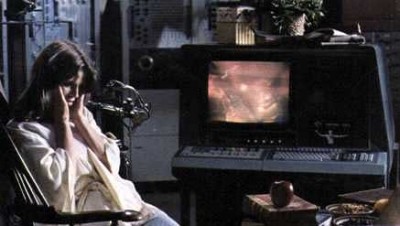 Visually, Demon Seed is also impressive. Proteus’ tetrahedron manifestation, which ingeniously suggests a halfway point between a machine and an organic creature, is particularly well-handled in design and execution by art director Edward Carfagno and special effects man Glen Robinson. The only real flaw in the film is the uninteresting abstract visual patterns that accompany Proteus’ words on his terminal display screens. Worst. Screensaver. Ever. And it’s with that thought in mind I’ll ask you to please join me next week when I have the opportunity to burst your blood vessels with another terror-filled excursion to the dark side of Hollywood for…Horror News! Toodles!
Visually, Demon Seed is also impressive. Proteus’ tetrahedron manifestation, which ingeniously suggests a halfway point between a machine and an organic creature, is particularly well-handled in design and execution by art director Edward Carfagno and special effects man Glen Robinson. The only real flaw in the film is the uninteresting abstract visual patterns that accompany Proteus’ words on his terminal display screens. Worst. Screensaver. Ever. And it’s with that thought in mind I’ll ask you to please join me next week when I have the opportunity to burst your blood vessels with another terror-filled excursion to the dark side of Hollywood for…Horror News! Toodles!
Demon Seed (1977)
 Horror News | HNN Official Site | Horror Movies,Trailers, Reviews
Horror News | HNN Official Site | Horror Movies,Trailers, Reviews
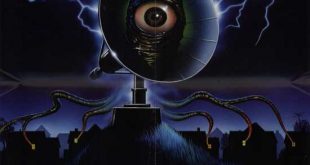





This is a great review of a very underrated movie!
Thanks for reading! I guess the subtext of Demon Seed is ‘The Luddites were right – first the machines put you out of work, and then they proceed to ruin your sex-life.’